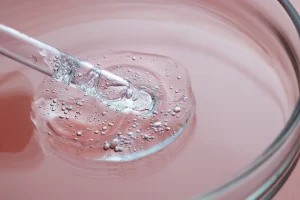One word you’ve probably seen popping up more and more is peptides. They’re hailed as powerful anti-aging agents and skin-repair superstars. But what exactly are they, and why are they gaining so much attention?
🔬 What Are Peptides?
Peptides are short chains of amino acids, which are the building blocks of proteins. In our skin, proteins like collagen, elastin, and keratin are made up of long chains of amino acids and peptides are essentially smaller fragments of these proteins.
Think of peptides as messenger molecules that tell your skin to produce more collagen or signal it to repair damage.

🧪 How Do Peptides Work in Skincare?
When applied topically, peptides can penetrate the upper layers of the skin and send signals to skin cells to perform specific functions like healing, firming, or hydrating.
Here’s what peptides can do:
- Stimulate collagen production to improve skin firmness and elasticity.
- Reduce fine lines and wrinkles by plumping the skin.
- Enhance skin barrier function, keeping moisture in and irritants out.
- Calm inflammation and support wound healing.

🧬 Types of Peptides Used in Skincare
Peptides aren’t a one-size-fits-all ingredient. There are different classes of peptides, each serving unique functions to address specific skin concerns. Understanding their roles helps both brands and consumers make smarter choices when formulating or purchasing skincare products.
1. Signal Peptides
- Function:
Signal peptides are like biological messengers. They send signals to skin cells (especially fibroblasts) to produce collagen, elastin, and glycosaminoglycans, all of which are essential for maintaining a firm, youthful, and plump complexion. - How They Work:
As we age, natural collagen production slows. Signal peptides mimic the body’s natural signals that trigger repair and regeneration, making the skin behave like it’s younger. - Key Benefits:
✓ Reduces the appearance of fine lines and wrinkles
✓ Improves firmness and elasticity
✓ Supports wound healing and barrier repair
- Example:
Palmitoyl Pentapeptide-4 (Matrixyl)
2. Carrier Peptides
- Function:
Carrier peptides bind to and deliver essential minerals to the skin, particularly copper and manganese, which are critical for enzymatic processes in tissue repair, skin renewal, and anti-inflammatory responses.
- How They Work:
These peptides help with cell signaling and repair by enhancing the bioavailability of minerals that are necessary for collagen synthesis and antioxidant defense. - Key Benefits:
✓ Boosts skin repair and regeneration
✓ Enhances skin renewal after damage or irritation
✓ Supports enzyme functions involved in collagen synthesis
- Example:
Copper Tripeptide-1 (GHK-Cu)
3. Neurotransmitter-Inhibiting Peptides
- Function:
These peptides interfere with the signals between nerves and muscles, causing a temporary relaxation of facial muscles. They work similarly to Botox, but without injections, making them a popular non-invasive alternative. - How They Work:
They reduce the release of acetylcholine, a neurotransmitter that causes muscle contractions. By doing so, they soften the appearance of dynamic wrinkles, especially on the forehead and around the eyes. - Key Benefits:
✓ Softens expression lines
✓ Reduces depth of wrinkles
✓ Provides a smoother, more youthful appearance
- Example:
Acetyl Hexapeptide-8 (Argireline)
4. Enzyme-Inhibitor Peptides
- Function:
As we age, enzymes like collagenase and elastase become more active, accelerating the breakdown of collagen and elastin fibers. Enzyme-inhibitor peptides block these enzymes, preserving the skin’s structural integrity.
- How They Work:
They prevent enzymatic degradation of the extracellular matrix — helping to slow aging at the molecular level and protect against environmental damage. - Key Benefits:
✓ Preserves skin firmness and elasticity
✓ Protects against premature aging
✓ Enhances long-term skin resilience
- Example:
Soy-derived peptides

🧴 Are Peptides Effective in Skincare?
Yes — but with some caveats.
Peptides are scientifically proven to improve skin texture, reduce wrinkles, and promote skin repair. However, their effectiveness depends on several factors:
- Formulation: Peptides need to be stable and correctly formulated to remain active.
- Concentration: The right amount must be present to have an impact.
- Delivery system: Encapsulation or pairing with other ingredients (like hyaluronic acid) enhances absorption.
Look for multi-peptide blends or products combined with hydrating agents and antioxidants for the best results.
🧑🔬 Why Peptides Are Popular in Modern Skincare
- Suitable for all skin types: Peptides are generally non-irritating and safe, even for sensitive skin.
- Non-invasive: Offers anti-aging benefits without injections or harsh procedures.
- Works well with other ingredients: Can be layered with retinol, vitamin C, niacinamide, and hyaluronic acid.
🧠 Final Thoughts
Peptides are one of skincare’s smartest innovations offering real, science-backed benefits with minimal risk. Whether you’re targeting wrinkles, improving skin tone, or boosting hydration, a peptide-rich product might be your skin’s new best friend.
Next time you see “peptides” on a product label, you’ll know you’re getting more than a trendy ingredient. You’re getting science that works.
Looking to create your own skincare line?
Partner with us to develop your custom peptide-infused products. Contact us today to start building your brand with a trusted OEM manufacturer.





